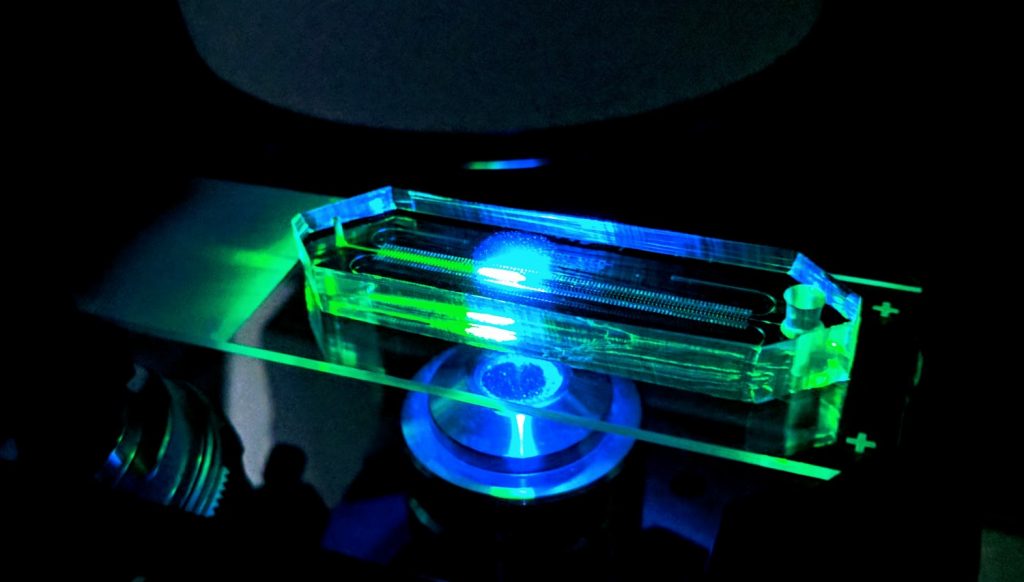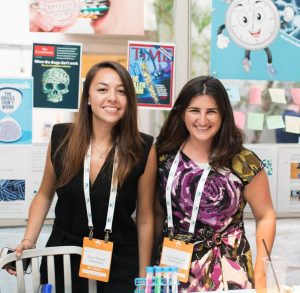Vanguard Diagnostics for Custom Antibiotics
An exemplary process of Technion technology transfer from lab to the marketplace is revealed in an early stage Startup, Nanosynex which offers a rapid and efficient diagnosis of antimicrobial resistance.
Your daughter is in pain with a urinary infection. To be safe while awaiting lab results, the doctor prescribes a large dose of a broad-spectrum antibiotic. This fails to work and the infection spreads: a superbug is colonizing the bloodstream. In finding the most effective antibiotic to counter infection, speed can save lives and it is the possibility of rapid diagnosis which Nanosynex is offering through its game-changing system.

Loading and scanning a nanoliter array device used to develop a rapid medical diagnostic for antibiotic resistance. Credit: Jonathan Avesar, Levenberg lab
Each year in the United States, at least two million people become infected with bacteria that are resistant to antibiotics and around 23,000 people die as a result, according to the Center for Disease Control (CDC). A report supported by the UK government and the Wellcome Trust predicts that Antimicrobial Resistance (AMR) could cost US$100 trillion between now and 2050, with the annual death toll reaching 10 million over that period. Established estimates reveal that for every hour that effective antibiotic treatment is delayed, survival rates drop by around 7.6% for patients with septic shock. Technologies that predict the resistance of a specific bacteria within the shortest possible time can save lives.
One such technology will be commercialized into an innovative system developed by Nanosynex. The test offers same-day results to help doctors determine the most appropriate antibiotic treatment for their patients. It uses a phenotypic approach involving microfluidic techniques and fluorescent-based analysis. The product will be marketed to laboratories in the form of disposable cards and a fluorescent reader

Nanosynex co-founders, Diane Abensur (CEO) & Michelle Heymann (VP Marketing)
Nanosynex technology is based on research from the laboratory of Prof. Shulamit Levenberg, Dean of the Technion Faculty of Biomedical Engineering. Prof. Levenberg and her team developed a diagnostic chip with hundreds of nanoliter wells containing a specific bacteria-antibiotic combination. The findings were published in the Proceedings of the National Academy of Sciences (PNAS).
Nanosynex co-founders, Diane Abensur (CEO) & Michelle Heymann (VP Marketing)
The highway to commercialization opened when two students from the Technion Startup MBA program chose technology from the laboratory of Prof. Levenberg as a case study as part of the entrepreneurship course. Initially funded by the Israel innovation Authority (IIA) Kamin grant, the entrepreneurs presented the business case at T³ (Technion Technology Transfer). They showed commitment from their first investor and strategic partner – the major shareholder of Biosynex – a French company in the rapid diagnostic industry with a distribution network in +60 countries. Nanosynex emerged as a Startup in 2017, with funding to further develop the concept. They began winning prizes, entered the Technion DRIVE Accelerator and signed a definitive license agreement with the Technion Research and Development Foundation (TRDF).
Nanosynex Co-founders Michelle Heymann and Diane Abensur were attracted to Technion because of its reputation for innovation and technology transfer. “Both passionate about Life Sciences, we were looking for an opportunity in this field and were determined to create a Startup that will respond to a huge need, make the world a healthier place, all that with a reasonable time to market so we could see through commercialization,” says Heymann. “We searched for technologies in the T³ Book of Big Ideas and started a deep scouting and analysis process of the top potential Technion discoveries with our strategic partner Biosynex. That’s how we understood that Prof. Levenberg’s research could bring us exactly what we were looking for.”
“Most of the tech-transfer process is a business deal that requires sharp negotiation skills and goodwill from all parties”, says Heymann. “We created Nanosynex based on a Technion technology, hired Technion alumni as employees and strive to make Nanosynex an important part of the Technion high-quality ecosystem at every opportunity. Nanosynex just closed its seed round of investment and is now fully dedicated to its prototyping.”


